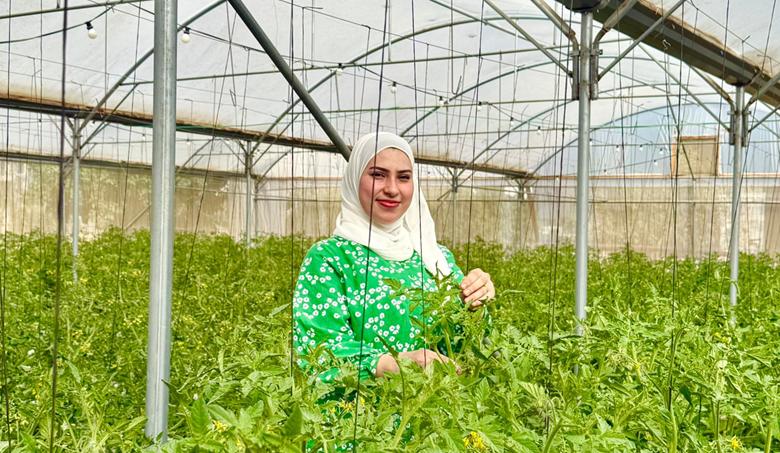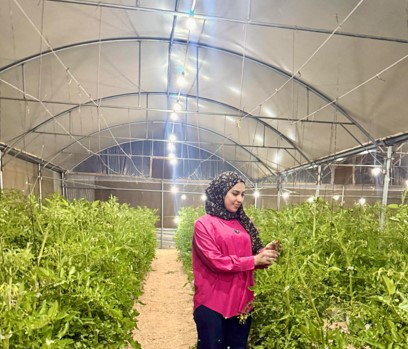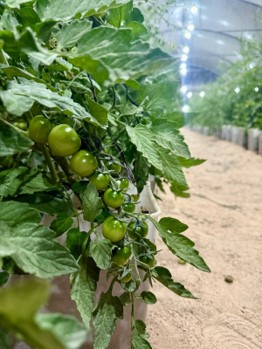
From job seeker to sustainable farming business entrepreneur
Recent graduate Jumana Al-Awawda was supported to access a sustainable income opportunity in the agrifood sector through FAO’s Green Jobs II project.
©FAO/Intissar Eshtayah
05/10/2025
Jumana Al-Awawda comes from the West Bank village of Dura, where limited economic opportunities often make it challenging for young people to pursue their aspirations. While studying at Al-Quds University near Jerusalem, she was introduced to hydroponics, a modern farming method that grows plants in a nutrient-rich solution instead of soil.
Fascinated by hydroponics’ potential, Jumana took the initiative to deepen her knowledge, researching the technique independently online She soon discovered that it not only improves crop quality but also significantly reduces usage of water, an important benefit in the West Bank, where water shortages are worsened by climate change, desertification, and the Israeli occupation.
After graduating in 2022, Jumana returned to Dura determined to find job opportunities that would help her achieve financial independence while contributing to the development of her community’s development. Jumana applied for an agrifood investment support grant under Green jobs II in 2024, a project implemented by the Food and Agriculture Organization of the United Nations (FAO) and funded by the Government of Denmark to create sustainable “green” job opportunities for young Palestinian women and men in the agrifood sector.
After a competitive selection process, Jumana received a grant through the project that, along with her own financial contribution, enabled her to build a greenhouse with a hydroponic system. Soon after, she grew her first crop of cherry tomatoes. She strategically chose to grow cherry tomatoes because they were uncommon in her hometown, ensuring her produce would attract attention at the local market in Dura.
In her very first season, Jumana harvested almost a ton of cherry tomatoes each month, selling them for 8 shekels per kilogram (about USD 2.15). She generated monthly revenues of about 7 680 shekels (approximately USD 2 070). Only a few months after graduating – and despite the worsening economic situation since 7 October 2023 – Jumana succeeded in securing for herself a reliable and significant source of income.


©FAO/Intissar Eshtayah
“This project gave me my own income and economic independence,” Jumana said.
Jumana’s ambitions had always extended beyond herself, and she was determined to build a family business. “My father, mother, and 19-year-old sister work with me, which strengthened our family bond and nurtured a spirit of teamwork,” she explained. “I was able to support my family and contribute significantly to our household income. The success of the hydroponic cherry tomato project wasn’t just an emotional victory; it had a real financial impact”.
With her family now financially stable, Jumana has chosen to continue her education, enrolling in a master’s degree programme in Agricultural Systems Management. She also reinvested part of her revenue in better production methods. She bought an additional water pump to improve irrigation in the greenhouse and increase the hydroponic system’s efficiency. She also installed mixers in the water tanks to blend organic fertilizer with water and grow more nutritious crops. These investments are expected to lower costs and reduce environmental impact while improving cherry-tomato yield and quality—translating into higher income and a better life for her family. “Today, I am no longer looking for an opportunity — I am creating one myself, and inspiring others to begin their journey toward independence and success.”
To date, Green Jobs II has enabled 1,199 young people aged 19–29 years to access green jobs and sustainable income opportunities in the agrifood sector. All participants received tailored training in personal development and agrifood skills; 511 also gained hands-on experience through on-the-job training and internships lasting up to six months. In addition, 100 young people received grants and mentoring to launch their own agrifood businesses.
Funded by the government of Denmark, the ‘Green Jobs and Sustainable Income Opportunities for Palestinian Youth in the Agrifood Sector’ project equips young Palestinian women and men with the skills to access green jobs and sustainable income. The initiative aims for sustained and scaled development impact beyond direct beneficiaries by capturing the knock-on effects of entrepreneurship, both in poverty reduction and green outcomes. Moreover, Green Jobs II seeks to advance the role of women in the agrifood sector and move towards a gender-transformative approach.
